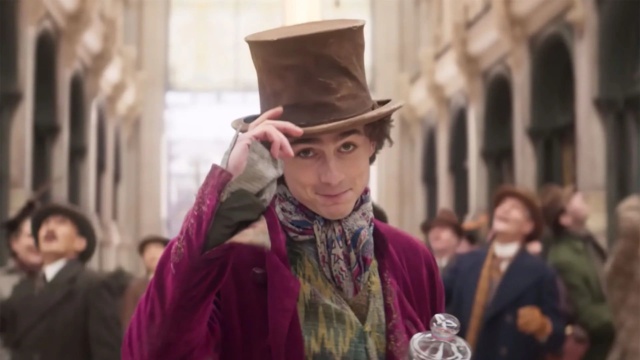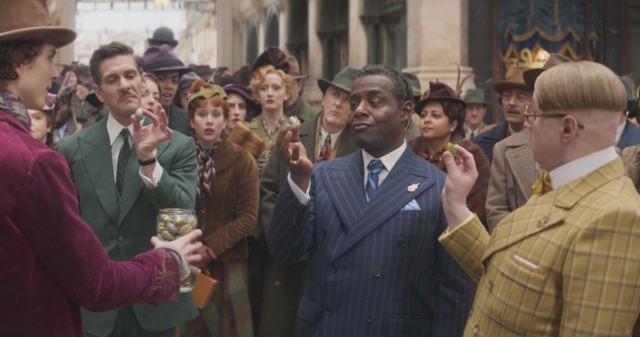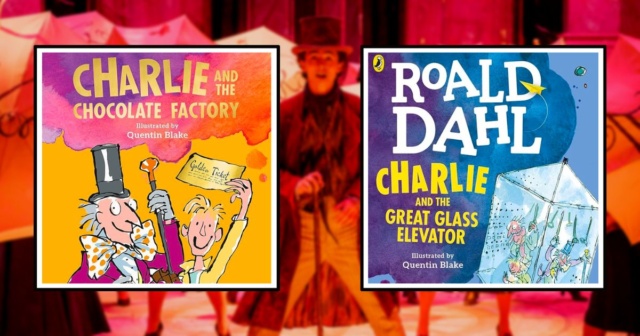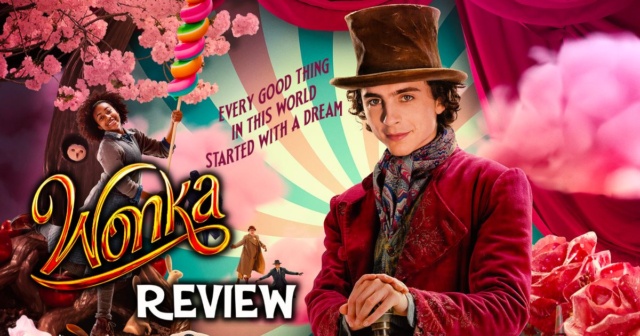Cosmic Psychologist: ‘Wonka’ and Personal Motivations

With my day job as a psychologist, it can sometimes be difficult to switch off that part of the brain when I’m off the clock. I try my best to separate my career from my personal life, however, when reading books, watching television, or taking in a film, there’s a part of me that analyzes what is going through the therapeutic lens. I don’t go into every film or experience expecting something to jump out at me and sometimes even surprise me. This was my experience upon seeing Wonka in theaters with my family.
Inspired by the Roald Dahl books Charlie and the Chocolate Factory and The Great Glass Elevator, Wonka looks into the early years of the eccentric chocolatier, serving as a spiritual origin story to Willy Wonka and the Chocolate Factory. With a novel that is 60 years old and that has been adapted twice previously, I didn’t know what the new film could say that is any different from the previous versions. However, this musical from Warner Brothers provided an excellent case study of motivation, as nearly every character has a distinct drive that pushes them toward their goals.
[Warning: spoilers from this film are below!]
Willy Wonka’s grief
Willy Wonka’s (Timothée Chalamet) drive is explored the most in this film, which shouldn’t come as too much of a surprise, considering the film is named after him. As a result, it’s also the most well-developed motivation, and serves as the emotional crux for the entire film. Because, you see, Willy’s desire to start a chocolate factory is because of his mother (Sally Hawkins) and the deep pain left by her loss.
In this film, we discover that Willy Wonka grew up poor, in a similar fashion to Charlie Bucket from the original story. It was just he and his mother, together on a boat, with not much money but a ton of love. Each year, on his birthday, his mother would gift him a homemade chocolate bar, made with love, that the two of them would share.
The echoes of Dahl’s work resound through the entire film, as there are many parallels between Charlie and Wonka. This makes their connection even deeper upon rewatching Willy Wonka and the Chocolate Factory or reading the novel.
However, unlike Charlie, Wonka loses his mother. This loss changes Wonka, but not necessarily for the worse. Her loss motivates him to become the amazing chocolatier that we all have come to know. He pushes to create extraordinary chocolates and develop a storefront of his own, because of a promise and the need for his mother.
She promised that she would be there on the day he opened his chocolate shop. While believing that his deceased mother would show up in person might be irrational, Willy couldn’t see past his grief, which gave him hope. He wanted nothing more than to be reunited with her, so he turned his grief into motivation, pushing himself to be the best at chocolate no matter what.

Instead of turning jaded and cold to the world, Wonka decided to embrace the love that his mother gave him and share that with others. Watching him on the journey of acceptance of this grief is truly something special. So many can understand just how heartbroken this young man is and the work he has to put in to come to terms with his loss.
That being said, while this is the biggest sense of motivation in the film, it is not the only one. Simon Farnaby and Paul King, who wrote the screenplay, took time to understand that motivation comes in many packages, some not friendly.
Power, fear, and greed motivate the film’s villians
Something that Wonka does, and does well, is that there isn’t just one villain that is in direct opposition to Willy, instead, there are several. Four to be exact, five if you count Keegan-Michael Key’s chief of police, which we will get to in a moment.
The main event of the dastardly villains is that of the three established chocolatiers, who set off to destroy Wonka before he even gets started. Arthur Slugworth (Paterson Joseph), Gerald Prodnose (Matt Lucas), and Felix Fickelgruber (Mathew Baynton) function, with their collective companies, as a sort of chocolate cartel. They move in unison, with Slugworth serving as the leader and brains of the operation.
Their main motivator is that of power and the desire to keep it by any means possible. They crave it and need it to survive in a way, which isn’t too far off from our real-world corporate life. However, if we dive a bit deeper, the true motivation behind the need for power is something much more innate to all people, fear.
Slugworth, Prodnose, and Fickelgruber built an empire out of chocolate and were unwilling to have anyone come in and take a slice of the pie. Their actions and the lengths to which they go to achieve their goals are pushed forward with the fear of losing everything they have built.
Fear is something we can all understand. We’ve all been fearful of something at one point or another. However, for these three, the fear is tied to the power, of losing the glory and power they have over the cornered market. Ruled by fear, they enlist the help of the tainted police force and the corrupt Mrs. Scrubitt (Olivia Colman) to stop Wonka from selling chocolates. Going so far as destroying the shop he built with the help of his friends.

Mrs. Scrubitt is in a similar boat as the three chocolatiers. She also wants control; however, her motivation stems from the desire for security. People who feel insecure tend to gain that security through controlling what they can in their environment. Mrs. Scrubitt takes this to an extreme, controlling people she’s tricked into working for her. Forced servitude is a gross maladaptive way to achieve that control, but this exaggerated situation highlights how sometimes people gather control through any means possible.
The final piece to the villainous puzzle is the chief of police, who is more of a lackey than anything else in this film. However, his love of chocolate and candy is a big motivator for him to bend the rules and serve as the private guard of the chocolate cartel. This does lead to some questionable gags about weight and size, but his greed is just another example of the motivations that Wonka showcases and does so well.
This is also seen in the actions of the chocolate-obsessed Father Julius (Rowan Atkinson), who allows the three chocolatiers to house their lair underneath the church. For just a small reward of chocolate, he’s satisfied with breaking his morals. Father Julius is such a small part of the film, but aligns with the notion of greed that the chief of police carries throughout the entire film.
Love and hope are powerful motivators
I’ve left love and hope for last, not because they are the least important to the larger picture of Wonka. Instead, it’s to end on a high note, to once again drive home that our tragedies in life don’t have to be negative motivators, but positive ones. When it comes to love and hope, there are two examples in the film, besides that of Wonka’s hope and his mother’s love. The first small example of the negative side effects of love comes in the form of Tom Davis’ Bleacher.
Bleacher is the right-hand idiot of Mrs. Scrubitt who does whatever she wants whenever she wants it. As we come to find out throughout Wonka, Bleacher is in love with Mrs. Scrubitt and will do anything to get her attention.
Eventually, he tricks her into being in a relationship with him, creating a false identity and sense of self to achieve the love he has been craving. While this isn’t ideal (please don’t create a fake background for yourself to win someone over), Bleacher’s motivation shows the power of love and the haphazard actions people will do to feel that connection with one another.
Finally, we have Noodle (Calah Lane), the orphan girl living at Mrs. Scrubitt’s place who reluctantly becomes Wonka’s assistant. When we first meet Noodle, she doesn’t have a ton of hope, she’s learned to accept her fate and how she’s going to be trapped at Mrs. Scrubitt’s forever.
All those who ended up working for Mrs. Scurbitt feel that same sense of hopelessness. However, with the help of Wonka, every one of them has hope restored in some way or another. For many of them, it’s just the hope of getting out, which is the promise that Wonka’s chocolate shop sells them, and the reason they decide to help out as much as possible. But for Noodle, there’s something else.
She develops hope of finding a family again. Having never known her parents, Noodle hopes to find that family she so longs for. As a viewer, you come to believe that in the end, Wonka will be the family she’s looking for, and in some ways that is true. However, Willy ends up reuniting with her mother, instilling in her a sense of good for the world. Noodle would not have moved forward in helping Wonka if it weren’t for the hope she had at finding her family, and the love she had for a mother she never knew.
Wonka is about so much more than delicious chocolate
Wonka has a lot going for it, so much so that it made the top five films I had for the year. It’s a great family film, with hilarious laughs and a ton of heart. It’s the heart that struck me the most, as a good portion of the heart deals with the motivation of these characters and the hopes they have for a brighter future.
I cannot stress enough how fantastic this film is, even eclipsing the original film with Gene Wilder for me. While you don’t have to go into it as a case study, I think having these motivations fresh in your head adds something to the film, as the nature of these characters becomes just a tad more clear.
Wonka is currently in theaters. Have you seen this film already? How do you compare it to the others? What do you think about the motivations of the characters in the film? Let us know on social media @mycosmiccircus or in The Cosmic Circus Discord!
Wonka Movie Review: A Delicious Addition to Willy Wonka’s Legacy




